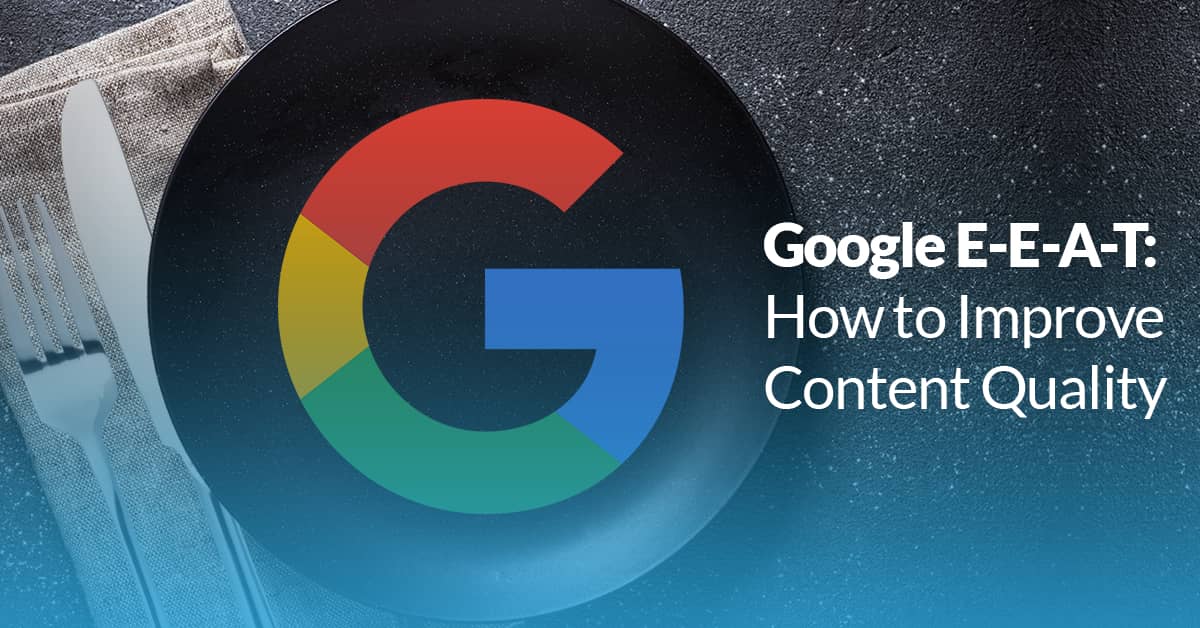E-E-A-T Up: What It Takes to Rank in Search
5 Minute Read
Google assesses hundreds of factors in order to determine the quality of a webpage and where it ranks in the search results. It’s a long and technical list that covers everything from the reputation of the website to the purpose of the page and more.
For many years, a helpful acronym has helped summarize how Google defines quality content. E-A-T (Expertise, Authoritativeness, and Trust) has long served as a guideline for SEOs and businesses when optimizing content to rank in search.
Now, Google has added a new element to its framework for SEO success. A recent Google update made Experience a key component for assessing content quality. The new acronym E-E-A-T (Experience, Expertise, Authority, and Trustworthiness) is now the order of the day for getting your website to rank.
Our SEO Content Experts are always on top of the latest algorithm updates and other changes that may affect our clients’ rankings. Close review of the documentation on page quality score has enabled us to crack the code for delivering content that ranks.

How Google Evaluates Content Quality
Ultimately, Google’s goal is to provide users with the search results that best meets their needs. Search algorithms take multiple factors into account when determining the quality of a particular page and whether it meets the needs of people who search for a specific keyword or query.
Deciphering search quality guidelines is no easy task. It’s literally a full-time job for in-house marketers and agencies alike. If you want to dominate the competition, however, it is critical to understand what Google is looking for and how you can rise to the challenge.
Understanding what E-E-A-T stands for may be easy, but ensuring that your website content embodies each element is more difficult. Here is what you need to do to maximize content quality so you can stand out in search:
1. Experience (NEW)
Experience is the new kid on the block. Google has tasked its Search Quality Raters to assess the experience underlying content in the following way:
“Consider the extent to which the content creator has the necessary first-hand or life experience for the topic. Many types of pages are trustworthy and achieve their purpose well when created by people with a wealth of personal experience. For example, which would you trust: a product review from someone who has personally used the product or a ‘review’ by someone who has not?”
Bottom line: Google is going to award a higher quality rating to pages where elements of firsthand experience are clearly identifiable. Experience is now a key ranking factor for product reviews (as we saw in the April 2023 update to the Google Reviews System), and we suspect it will be heavily weighted in ranking other types of content.
Google is looking for more than just textual mentions (e.g., “In my experience …”) when evaluating experience at the heart of content. If you have video and audio testimonials from satisfied customers, these should be integrated onto service and product pages ASAP. It is also important to highlight your industry experience, so make sure your About Us and bio pages are as strong as possible.
Read More: How Reviews Positively Impact SEO
2. Expertise
There is some overlap between “Experience” and “Expertise.” In the context of E-E-A-T, the main difference is that experience relates to how the content communicates firsthand knowledge of a product, service, etc. to the user. Expertise, meanwhile, tends to concern different aspects of the creator’s background that build credibility. These include:
- Skills
- Education
- Training
- Certifications
- Awards and other forms of professional recognition
Again, any and all credentials you and your business have need to be clearly communicated on the pages of your website. Your expertise should be woven throughout the content so Google can rate your pages highly. This can be achieved through written content, photos and videos that demonstrate your expertise to customers, and quantitative measurements illustrating that you are an expert in your field (such as the number of projects completed, dollar figures, etc.).
Read More: 10 Ways to Incorporate Videos Into Your Marketing
3. Authoritativeness
People and brands are considered an authority if they are the go-source for information on a particular topic, industry, geographic area, etc. Only a source with demonstrated experience and expertise will be considered authoritative enough to top the results in Google search.
Authoritativeness can be established through ongoing efforts to publish content that (a) thoroughly addresses the user’s query while (b) highlighting your expert status. Backlinks (i.e., links to your website from other domains) can be viewed by Google as a vote of confidence in your page. In addition to content, then, you need to invest in link earning efforts on high-quality domains.
4. Trust
Internal documentation shows that Google values Trust more than any other component of E-E-A-T. Trust is determined based on whether “the page is accurate, honest, safe, and reliable.” Although this may overlap with some elements of Experience, Expertise, and Authoritativeness, Google considers Trust the most important because it concerns whether a given page is harmful to the user (whether due to the information it contains, a security risk, etc.).
Trust is particularly important for pages classified as Your Money or Your Life (YMYL). YMYL content addresses issues such as health, finances, personal safety, and public trust. Google recognizes the importance of delivering trustworthy information on these topics because the consequences of misinformation could be dire.
Even if your business doesn’t deal with YMYL issues, building trust is paramount. You are asking people for their hard-earned money in exchange for your product or service. Customers need to know that they can trust you. Likewise, Google needs to feel confident that the content on your website is trustworthy.
Some aspects of cultivating trust involve the design and development of your website, such as use of HTTPS protocol, minimizing the use of plugins that create security vulnerabilities, etc. As with the other components of E-E-A-T, the content on your website must also provide accurate and reliable information users can count on when searching for products and services.

Boost Your E-E-A-T for Better Search Results
Ranking on the first page and staying on top is not easy. Google algorithms are updated frequently, which can change the search results on a dime. The best way to future-proof your content for algorithm updates is to follow Google’s guidelines for creating quality content.
Unfortunately, many businesses struggle with content development. Producing content regularly is time- and labor-intensive, and it can be difficult to know exactly what it takes to rank ahead of the competition.
Read More: How Google Search Works in 2023
At Twelve Three Media, we specialize in creating content of the highest caliber for clients across multiple industries. We closely follow Google’s guidelines for content quality and integrate the elements of E-E-A-T across all areas of your website. Our goal is to help you dominate the SERPs so your business can thrive.
